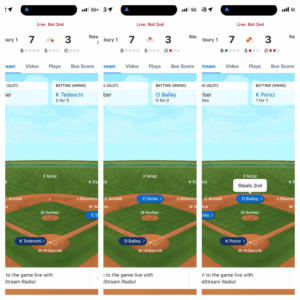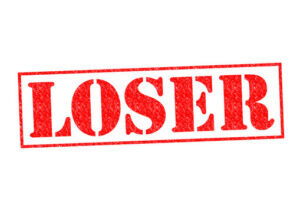Matthew Dicks's Blog, page 19
May 19, 2025
Watching Charlie perform on Broadway
Elysha and I were in New York City on Saturday, sitting the mezzanine at the Palace Theater on Broadway, preparing to watch Keiran Culkin, Bob Odenkrikl, Bill Burr, Michael McKean, and others in “Glengarry Glen Ross”
About 100 miles to the northeast, Charlie was playing in a baseball game. As we waited for the show to start, I watched as Charlie walked, stole second, reached third on an error, and was stranded before scoring.
It’s the beauty of technology—an app called Game Changer turned my son’s baseball game into a play-by-play video game that I could watch from anywhere in the world. I couldn’t see him on video, though if the field had video cameras or a parent at the game chose to live stream, I could’ve been watching that, too. But I saw a digital representation of the field, with Charlie’s name beside a dot as he stood at the plate, taking balls and strikes before making his way to first base.
Kind of amazing.
Constant connection isn’t good for anyone. The ability to ignore, unplug, turn off, and focus on the moment is critical, but there are also moments when you want to be in two places at the same time, and though it’s impossible, technology can make it a little more possible.
On Saturday afternoon, that was the case for me.
When the show was over, I flipped back over to the app, where I could watch a replay of the game to see how he had performed at the plate during his other at-bats while I was watching the play.
Before we left New York for home, I knew exactly how the game had gone, both for him and his team.
My parents attended very few of my Little League games when I was a boy. They never saw me sprint, long jump, or pole vault as a member of the track team. Never attended any of the band shows in my six years with the high school marching band and drum corps.
The fact that I can be sitting in a Broadway theater while monitoring Charlie’s game is a delightful thing and also a slight punch in the gut:
A reminder of how much I want to be watching my kids’ games and recitals and concerts and cubing tournaments and everything else, and how I can’t imagine not wanting to.
Charlie’s team lost 12-3, which was unfortunate, of course, but I missed all of that. I did not bear witness to the frustration, disappointment, and sadness of an afternoon spent in the sun without a victory.
Instead, I watched a great play in a beautiful theater in the company of Elysha. Enjoyed omlettes at the Carnegie Deli. Walked the streets of Manhattan.
Not an afternoon in the sun on the edge of a ballfield, but still pretty great.

May 18, 2025
Pure as the driven snow
There have been 1,826 alleged ethics violations in the US Senate since 2007.
More than 107 ethics complaints per year.
More than one alleged violation of ethics for each Senator each year.
The number of disciplinary actions taken in response to these 1,826 complaints since 2007?
Zero.
Remarkably, all 1,826 alleged ethics violations didn’t happen, even though a former Senator serving as recently as 2024 was just sentenced to prison in April for crimes that would absolutely amount to ethics violations.
There is also ample public evidence of violations, including documented violations of the Stop Trading on Congressional Knowledge Act of 2012.
Except apparently not, since no Senator has been found guilty of an ethics violation in 18 years. Despite evidence to the contrary, the US Senate is filled with politicians as pure as the driven snow.
“Throw the bums out!” is a ridiculous statement representing an emotional overreaction to an often manageable situation, but it’s starting to sound more rational to me by the day.

May 16, 2025
Substack topic?
Substack contacted me to discuss joining their platform and monetizing some of my writing.
Having written a blog post for nearly 20 years without missing a day, it makes sense to consider making money off some of my content.
Not everything I write, including this post, is worthy of payment, but perhaps I could take an area of interest or expertise and move it over to the Substack platform in a more considered and thoughtful way.
The question, of course, is what?
I suspect that amusing stories about my children would make for monetizable content. Nor would my angry screeds on the state of US politics or my frustration with my cats.
In case you don’t know, Substack is a platform that allows writers and creators to publish newsletters, podcasts, and video content and build a subscription-based audience. It’s essentially a publishing platform that provides tools for creating, distributing, and monetizing content via subscriptions, allowing creators to connect directly with their audience.
So if I were to write a weekly or biweekly column on Substack, what would it be?
Any ideas?
I wouldn’t write about storytelling or communication, since I already have an entire business centered on that topic and wouldn’t want to cannibalize one to feed another.
Other ideas include:
Personal or creative productivity
Advice and ideas on writing
Advice and ideas on teaching
Advice or ideas on parenting
Advice and ideas on marriage
I’m not implying that I have expertise on all of these topics, but I have advice and ideas on all of them—a nearly endless amount—so I could write on any of these topics for a long time, even if readers think the ideas are hooey.
Of course, the less hooey my thoughts, the more money I could make.
I’ve also considered dedicating my blog to a single story for a month or two—the recounting of a band of anonymous cowards’ attempt to destroy my teaching career 18 years ago in a profound, insidious, and unbelievable way. I have a huge amount of material from those two years of my life, including lots of contemporaneous notes on the subject, and I’ve wanted to write about it for a long, long time.
Rather than dedicating my blog to the topic for a month or two, I could make it the topic of my Substack, though I think I’d rather have that story be as widely distributed as possible.
Then again, giving my blog over to a single story for a month or more sounds a little crazy. I have so many ideas running through my mind that I’m constantly fighting over what to write on a single day. To hold every one of those ideas back for a month or more almost sounds impossible.
So maybe?
And if not that story, maybe a story about another period of my life. Perhaps the time I spent homeless, jailed, awaiting trial for a crime I didn’t commit, living with a family of Jehovah’s Witnesses, sharing a room with a goat, falling victim to a violent crime that led me to a lifetime of PTSD, and ultimately being found not guilty in court.
Those were interesting times.
Or maybe the three years I spent after high school living in the Heavy Metal Playhouse — a townhouse in Attleboro, MA, with my friend Bengi. I have plenty of stories, insight, and wisdom from those years, and lots of contemporaneous writing about that time.
Or my childhood?
Or the 26 years I’ve spent teaching?
Maybe wisdom from two decades on the golf course?
I’m not sure.
So… thoughts? Ideas? Criticism?
I’d love to know what you think.

May 15, 2025
Parents aren’t reading to kids!
A sign of the pending apocalypse:
Less than half of parents find it fun to read aloud to their children, new research shows.
Only 40% of parents with children aged 0 to 13 agreed that “reading books to my child is fun for me,” according to a survey conducted by book data company Nielsen and publisher HarperCollins.
The survey shows a steep decline in the number of parents reading aloud to young children. Only 41% of 0—to four-year-olds are now being read to frequently, down from 64% in 2012.
I don’t know which is worse:
A parent’s inability to find joy in reading to their child or that inability to find joy resulting in less time spent reading to their child.
Probably the latter. Right?
Though I can’t imagine not having fun reading to your child, it’s far worse—catastrophically worse—to imagine parents abandoning the reading of books to their children for the selfish and stupid reason that they don’t enjoy it.
What the hell is wrong with these people?
More disturbing news:
A significant gender disparity was also identified, with 29% of 0- to two-year-old boys being read to every day or nearly every day compared with 44% of girls of the same age.
What the hell is going on in the American home?
This is not an issue of time or money. This is not a survey about a parent’s ability to find the time to read to their child or the variety and quantity of books to read, which, depending on income level and work schedules, might present a barrier to reading at home.
This is a survey about how much parents enjoy reading to their child, how that enjoyment impacts the amount of time spent reading, and how the child’s gender might inexplicably affect the amount of time they read.
This is a survey about feelings and choice, and it signals disaster.
Elysha and I read to our kids every single night without fail until Charlie was about nine years old and Clara was about 12 years old. It began with hundreds of picture books and eventually transformed into the family gathering nightly for the Harry Potter series.
Followed, of course, by the films and the Broadway show.
After that, we continued to read to the kids more sporadically until it finally came to an end about two years ago.
I still miss it.
I loved reading to my kids. And on those rare days and nights when I didn’t want to read “Goodnight Moon” for the four hundredth time, I still read the damn book to my kids because it was the right thing to do.
Also, children who are read to daily—just 15 to 20 minutes—are almost three times as likely to choose to read independently compared to children who are only read to weekly at home.
Research also shows that reading to your child daily:
Expands vocabulary and improves language skills.Builds early literacy and prepares children for school success.Enhances comprehension, memory, and attention span.Correlates with stronger reading and writing skills.Promotes a lifelong love of learning and books.Strengthens the parent-child bond through shared time and attention.Encourages empathy and emotional understanding by exposing children to diverse characters and situations.Helps children manage stress and emotions through comforting routines and stories.Stimulates the imagination and fosters creative thinking.Encourages curiosity and questioning, laying the groundwork for critical thinking.Creates a consistent, calming daily routine, often supporting better sleep and behavior.The ROI of reading to your child is astronomical. It would be stupid not to read to your kid daily.
Yet parents are abandoning the process because it’s not fun?
What is wrong with people?
As an elementary school teacher for the last 26 years, I can also attest to these facts:
The vast majority of my students still love being read to daily.My students still love reading in school, but it has decreased over the years.More than half of my students do not read independently at home.The students who read or are still read to at home perform considerably better academically.Reading to your child for 15-20 minutes daily is not a difficult task.
For most of us, it was incredibly enjoyable. It created lifelong memories centered on our kids, the stories they loved, and the time we spent together as a family.
It turned both of our kids into readers who love books, choose to read independently, and love libraries and bookstores.
It will do the same for most children.
Even if it’s beyond your capacity to enjoy the process yourself.

May 14, 2025
Wisdom and experience make a difference
College basketball is getting older.
In 2019, the average age of a Sweet 16 starter in the men’s tournament was 20.8.
In 2021, it rose to 21.2.
In 2025, the average age was 21.6 years.
The starting five players on Auburn this year averaged 23.2 years old, which is older than the starting lineups of five NBA teams this season and two years older than the Washington Wizards’ starting lineup, which came in at 21.2 years old.
I didn’t get to college until I was 23 years old. No teacher or guidance counselor in my high school, nor any of my parents, ever spoke the word “college” to me, so I never took the SAT and never set foot in the guidance office.
Never even contemplated the possibility of college.
Instead, I graduated and was immediately on my own, absent any parental safety net, for the rest of my life.
I spent five years in a series of adventures and misadventures that included homelessness, jail, and a trial for a crime I didn’t commit. I also shared a room with a goat for about a year. I was exceptionally poor, working endless hours, and surprisingly happy much of the time.
Once I was found not guilty in a court of law, I began my collegiate journey, first at Manchester Community College and later at Trinity College and St. Joseph’s University.
Though I wish I had been able to attend college directly out of high school, I am also quite certain that I managed to extract more from my education—even while managing McDonald’s restaurants fulltime, launching a DJ business, and working on campus in the writing center—than I would have at age 18.
The fact that these college athletes are getting older is not a bad thing. Age, life experience, and wisdom make a big difference in one’s approach to higher education. Some 18-year-olds are quite ready for the experience, but I suspect that many are not.
A little more life under their belt can make all the difference.
I suspect that if given a chance, I would have been ready at 18, but I was even more prepared at 23. I missed out on many of the things that make college life joyous and unforgettable, and I know I would have made friends who would last a lifetime, but I stepped onto campus as a man on a mission.
After being homeless, jailed, tried for a crime I did not commit, and forced to share a room with a farm animal, nothing seemed hard anymore. Working a full-time job and launching a business while also going to school full-time — working in student government, writing for the college newspaper, serving as President of the National Honor Society, and tutoring in the writing center — seems impossible to me today, but back then, I was so happy, grateful, and joyous to be learning on a college campus that nothing could have stood in my way.
With so much struggle and trauma behind me, I was unstoppable.
I suspect that at least a few of Auburn’s old men understood this, too. The team made it to the Final Four of the NCAA Tournament this year, but it lost to the eventual champion Florida Gators in a close game after one of its stars was limited by injury.
Wisdom and experience can really make a difference.

May 13, 2025
Smile. Don’t wallow.
The robb’d that smiles steals something from the thief; He robs himself that spends a bootless grief.”
— William Shakespeare (Othello)
I’ve always loved this line.
It suggests that a victim who can maintain composure after being robbed (or harmed in any way) gains something by not being consumed by despair.
Conversely, dwelling on the loss is ultimately self-destructive.
In the words of that famous British slogan from World War II:
Keep calm and carry on.
The former is admittedly difficult but doable:
Maintain your composure.
Smile in the face of adversity.
Thumb your nose at life’s misfortunes.
Move forward with aplomb.
Excellent advice that isn’t always possible.
Also, when you’re the kind of person who frequently adopts this position, as I try to do, people around you will often become annoyed, frustrated, and even angry at your sunny-side disposition.
I have been yelled at and insulted — behind my back and to my face — for maintaining a positive attitude in less-than-ideal times.
Still, it’s a great way to be if you can manage.
But the latter is much easier and more essential:
Don’t waste time perseverating or ruminating.
Stop complaining.
Don’t waste time circling the drain.
This is a far more doable and manageable response to disappointment and tragedy, and when you manage to do so, people will appreciate and admire you. Maybe even find you inspiring.
Few people will fault you if you’re unable to smile in the face of adversity.
But many people will quickly tire of you if you endlessly wallow in despair.
At least according to Shakespeare.

May 12, 2025
Microplastics and me
A new study published in Science of the Total Environment examined caddisfly larval casings dating back to the 1970s to determine when microplastics first appeared.
When they hatch from eggs, caddisfly larvae use nearby material to encase their bodies in self-made, improvised shells, thus leaving behind artifacts from the past.
Scientists are so clever.
They found that small fragments of plastic have been appearing for decades, with one dating back to as early as 1971, which incorporated a piece of yellow plastic.
So 1971 featured the emergence of microplastics and also Matthew Dicks:
Two small, possibly problematic additions to the universe.

May 11, 2025
Chocolate chiplesss cookies?
Last year, Bon Appétit published a recipe for a chocolate chipless cookie along with an article about the recipe.
The title reads:
“What’s a Chocolate Chipless Cookie? Tasty but Controversial.”
I don’t know much about this recipe except this:
Sarah Fennel, who invented the recipe and published it on her popular Broma Bakery blog, was likely more interested in clicks than better cookies.
This is the kind of recipe designed to annoy people.
Invent all the cookie recipes you want, but don’t tell me it’s a “chocolate chipless cookie” and expect me to take this lying down.
Some things need not be things.
A chocolate chip cookie without chocolate chips is one of them.

May 10, 2025
Words matter
My former principal, Plato Karafelis, referred to substitute teachers as “visiting teachers” because he wanted to show them greater respect and appreciation for their work.
Plato retired more than a decade ago, but I still use that term to describe the teachers who fill in for me when I am absent because his words were good, just, and productive.
The UAE recognizes people with disabilities as “people of determination” in recognition of their struggles and achievements.
I love this so much.
We have shifted from using the word “victim” to “survivor” in many trauma instances for similar reasons. We honor who they are rather than what someone has done to them.
I’ve always described myself as the victim of a terrible, violent crime when I was 22 years old that left me with a lifetime of PTSD.
Perhaps I should refer to myself as a survivor instead. It doesn’t quite feel right, but change is hard, but sometimes necessary.
This is why I stopped jokingly describing messy students as “savages” after learning that during colonialism and European expansion, “savage” was weaponized to describe indigenous peoples, Africans, and other non-Europeans. It became a tool for dehumanization, justifying slavery, land theft, cultural destruction, and murder by branding people as “less than” or “uncivilized.”
It was a simple change that acknowledged the horrors of history.
Words matter.
Whether we are elevating the status of a substitute teacher or disabled person, redefining the victim of trauma, or acknowledging the injustice and violence of the past, words matter.

May 9, 2025
Losers are ruining the world
“I knew that one day we might have to watch as capitalism and greed and bigotry led to a world where powerful men, deserving or not, would burn it all down. What I didn’t expect, and don’t think I could have foreseen, is how incredibly cringe it would all be. I have been prepared for evil, for greed, for cruelty, for injustice – but I did not anticipate that the people in power would also be such huge losers.”
Rachel Shaw of The Guardian is writing, of course, about Elon Musk, Mark Zuckerberg, and the like.
I like these sentences a lot.
I also think this sentiment is both accurate and useful.
The worst thing you can do to someone like Musk, Zuckerberg, or Trump is to laugh at them.
Or even better:
Make fun of them in a way that causes others to laugh at them.
Lacking a healthy ego and a true sense of self, these spineless men demand capitulation and sycophancy to procure the love and respect they so desire because they cannot find it within themselves or willingly from the people around them.
This is the problem with the bully, the liar, and the confabulist:
They lack self-love, so they must demand, manipulate, or fabricate it from others, even if it’s incredibly obvious that the love expressed is false, forced, or expressed for self-gain.
Laughing at them is the last thing they want. It’s something that cringy losers like Donald Trump and Elon Musk cannot bear. They can’t make fun of themselves, and they especially really can’t abide others making fun of them.
It reminds them of who they believe themselves to be in the quiet of their hearts.
It’s a signal that their delicate facade is cracked. We see through their patina of bluster and braggadocio.
We also see them for who they truly are.
So keep it up, Rachel Shaw. Let these cringy losers know that we see their true selves with clear eyes and abject disgust.




